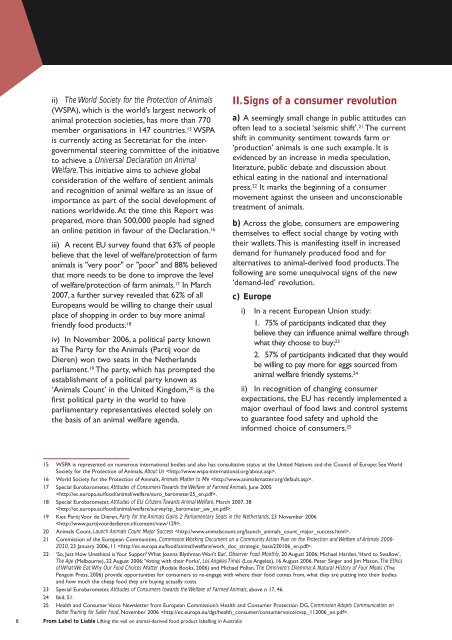From Label to Liable: Scams, Scandals and Secrecy - Voiceless
From Label to Liable: Scams, Scandals and Secrecy - Voiceless
From Label to Liable: Scams, Scandals and Secrecy - Voiceless
Create successful ePaper yourself
Turn your PDF publications into a flip-book with our unique Google optimized e-Paper software.
ii) The World Society for the Protection of Animals<br />
(WSPA), which is the world’s largest network of<br />
animal protection societies, has more than 770<br />
member organisations in 147 countries. 15 WSPA<br />
is currently acting as Secretariat for the intergovernmental<br />
steering committee of the initiative<br />
<strong>to</strong> achieve a Universal Declaration on Animal<br />
Welfare. This initiative aims <strong>to</strong> achieve global<br />
consideration of the welfare of sentient animals<br />
<strong>and</strong> recognition of animal welfare as an issue of<br />
importance as part of the social development of<br />
nations worldwide. At the time this Report was<br />
prepared, more than 500,000 people had signed<br />
an online petition in favour of the Declaration. 16<br />
iii) A recent EU survey found that 63% of people<br />
believe that the level of welfare/protection of farm<br />
animals is "very poor" or "poor" <strong>and</strong> 88% believed<br />
that more needs <strong>to</strong> be done <strong>to</strong> improve the level<br />
of welfare/protection of farm animals. 17 In March<br />
2007, a further survey revealed that 62% of all<br />
Europeans would be willing <strong>to</strong> change their usual<br />
place of shopping in order <strong>to</strong> buy more animal<br />
friendly food products. 18<br />
iv) In November 2006, a political party known<br />
as The Party for the Animals (Partij voor de<br />
Dieren) won two seats in the Netherl<strong>and</strong>s<br />
parliament. 19 The party, which has prompted the<br />
establishment of a political party known as<br />
‘Animals Count’ in the United Kingdom, 20 is the<br />
first political party in the world <strong>to</strong> have<br />
parliamentary representatives elected solely on<br />
the basis of an animal welfare agenda.<br />
II.Signs of a consumer revolution<br />
a) A seemingly small change in public attitudes can<br />
often lead <strong>to</strong> a societal ‘seismic shift’. 21 The current<br />
shift in community sentiment <strong>to</strong>wards farm or<br />
‘production’ animals is one such example. It is<br />
evidenced by an increase in media speculation,<br />
literature, public debate <strong>and</strong> discussion about<br />
ethical eating in the national <strong>and</strong> international<br />
press. 22 It marks the beginning of a consumer<br />
movement against the unseen <strong>and</strong> unconscionable<br />
treatment of animals.<br />
b) Across the globe, consumers are empowering<br />
themselves <strong>to</strong> effect social change by voting with<br />
their wallets. This is manifesting itself in increased<br />
dem<strong>and</strong> for humanely produced food <strong>and</strong> for<br />
alternatives <strong>to</strong> animal-derived food products. The<br />
following are some unequivocal signs of the new<br />
‘dem<strong>and</strong>-led’ revolution.<br />
c) Europe<br />
i) In a recent European Union study:<br />
1. 75% of participants indicated that they<br />
believe they can influence animal welfare through<br />
what they choose <strong>to</strong> buy; 23<br />
2. 57% of participants indicated that they would<br />
be willing <strong>to</strong> pay more for eggs sourced from<br />
animal welfare friendly systems. 24<br />
ii) In recognition of changing consumer<br />
expectations, the EU has recently implemented a<br />
major overhaul of food laws <strong>and</strong> control systems<br />
<strong>to</strong> guarantee food safety <strong>and</strong> uphold the<br />
informed choice of consumers. 25<br />
8<br />
15 WSPA is represented on numerous international bodies <strong>and</strong> also has consultative status at the United Nations <strong>and</strong> the Council of Europe: See World<br />
Society for the Protection of Animals, About Us .<br />
16 World Society for the Protection of Animals, Animals Matter <strong>to</strong> Me .<br />
17 Special Eurobarometer, Attitudes of Consumers Towards the Welfare of Farmed Animals, June 2005<br />
.<br />
18 Special Eurobarometer, Attitudes of EU Citizens Towards Animal Welfare, March 2007, 38<br />
.<br />
19 Kies Partij Voor de Dieren, Party for the Animals Gains 2 Parliamentary Seats in the Netherl<strong>and</strong>s, 23 November 2006<br />
.<br />
20 Animals Count, Launch Animals Count Major Success .<br />
21 Commission of the European Communities, Commission Working Document on a Community Action Plan on the Protection <strong>and</strong> Welfare of Animals 2006-<br />
2010, 23 January 2006, 11 .<br />
22 ‘So, Just How Unethical is Your Supper What Joanna Blythman Won't Eat’, Observer Food Monthly, 20 August 2006; Michael Harden, ‘Hard <strong>to</strong> Swallow’,<br />
The Age (Melbourne), 22 August 2006; ‘Voting with their Forks’, Los Angeles Times (Los Angeles), 16 August 2006. Peter Singer <strong>and</strong> Jim Mason, The Ethics<br />
of What We Eat: Why Our Food Choices Matter (Rodale Books, 2006) <strong>and</strong> Michael Pollan, The Omnivore's Dilemma: A Natural His<strong>to</strong>ry of Four Meals (The<br />
Penguin Press, 2006) provide opportunities for consumers <strong>to</strong> re-engage with where their food comes from, what they are putting in<strong>to</strong> their bodies<br />
<strong>and</strong> how much the cheap food they are buying actually costs.<br />
23 Special Eurobarometer, Attitudes of Consumers <strong>to</strong>wards the Welfare of Farmed Animals, above n 17, 46.<br />
24 Ibid, 51.<br />
25 Health <strong>and</strong> Consumer Voice Newsletter from European Commission’s Health <strong>and</strong> Consumer Protection DG, Commission Adopts Communication on<br />
Better Training for Safer Food, November 2006 .<br />
<strong>From</strong> <strong>Label</strong> <strong>to</strong> <strong>Liable</strong> Lifting the veil on animal-derived food product labelling in Australia


